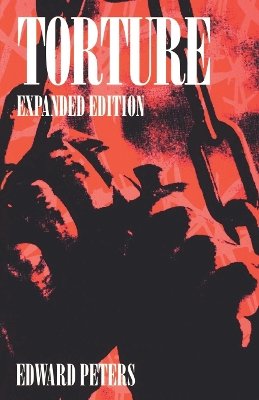8%OFF

Stock image for illustration purposes only - book cover, edition or condition may vary.
Torture
Edward Peters
€ 36.99
€ 33.93
FREE Delivery in Ireland
Description for Torture
Paperback. "In the restrained prose of Torture lies a passionate message about the intentional violation of the bodies of human beings, in our time and in the past."-New York Times Num Pages: 304 pages, black & white illustrations. BIC Classification: HBG; JFFE; JKVP1. Category: (U) Tertiary Education (US: College). Dimension: 212 x 143 x 20. Weight in Grams: 434.
"Torture has ceased to exist," Victor Hugo claimed, with some justification, in 1874. Yet more than a century later, torture is used routinely in one out of every three countries. This book is about torture in Western society from earliest times to the present.
A landmark study since its original publication a decade ago, Torture is now available in an expanded and updated paperback edition. Included for the first time is a broad and disturbing selection of documents charting the historical practice of torture from the ancient Romans to the Khmer Rouge.
Product Details
Format
Paperback
Publication date
1996
Publisher
University of Pennsylvania Press
Condition
New
Number of Pages
304
Place of Publication
Pennsylvania, United States
ISBN
9780812215991
SKU
V9780812215991
Shipping Time
Usually ships in 7 to 11 working days
Ref
99-1
About Edward Peters
Edward Peters is Henry Charles Lea Professor of History at the University of Pennsylvania. His publications include The Magician, the Witch, and the Law, Heresy and Authority in Medieval Europe, The First Crusade, and, with Alan C. Kors, Witchcraft in Europe, 400-1700: A Documentary History, all available from the University of Pennsylvania Press.
Reviews for Torture
"In the restrained prose of Torture lies a passionate message about the intentional violation of the bodies of human beings, in our time and in the past."
New York Times
"Torture goes beyond the solemn declaration of evil's banality. It offers an explanation of how institutional characteristics-even more strongly than personal ones like sadism or psychosis-produce that evil. It contributes to our understanding-if we dare call it that-of how creatures who begin by crying for their mothers can graduate to bashing in heads."
Philadelphia Inquirer
"A masterful analytical history of torture's emergence in Roman law, its insertion into the medieval law of proof, its gradual abolition after 1750, and its dreadful recrudescence in modern times. The book is an exemplary application of historical scholarship to an issue where emotions tend to run ahead of reason."
Times Literary Supplement
New York Times
"Torture goes beyond the solemn declaration of evil's banality. It offers an explanation of how institutional characteristics-even more strongly than personal ones like sadism or psychosis-produce that evil. It contributes to our understanding-if we dare call it that-of how creatures who begin by crying for their mothers can graduate to bashing in heads."
Philadelphia Inquirer
"A masterful analytical history of torture's emergence in Roman law, its insertion into the medieval law of proof, its gradual abolition after 1750, and its dreadful recrudescence in modern times. The book is an exemplary application of historical scholarship to an issue where emotions tend to run ahead of reason."
Times Literary Supplement
